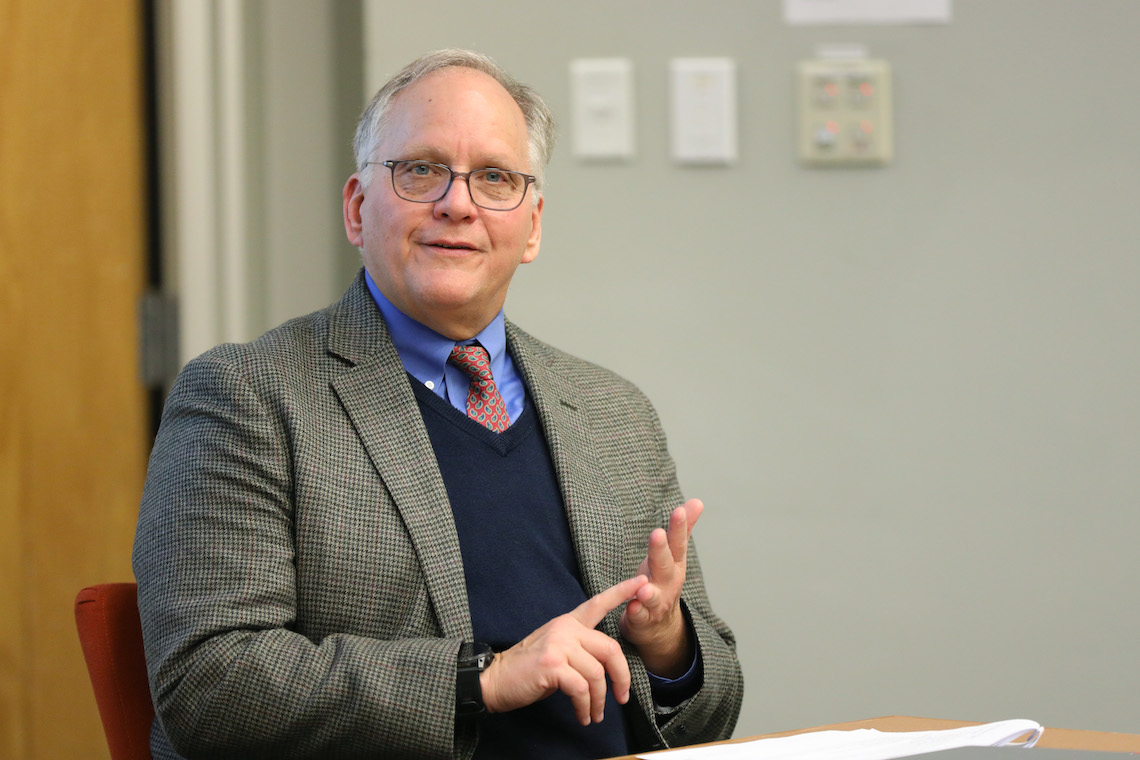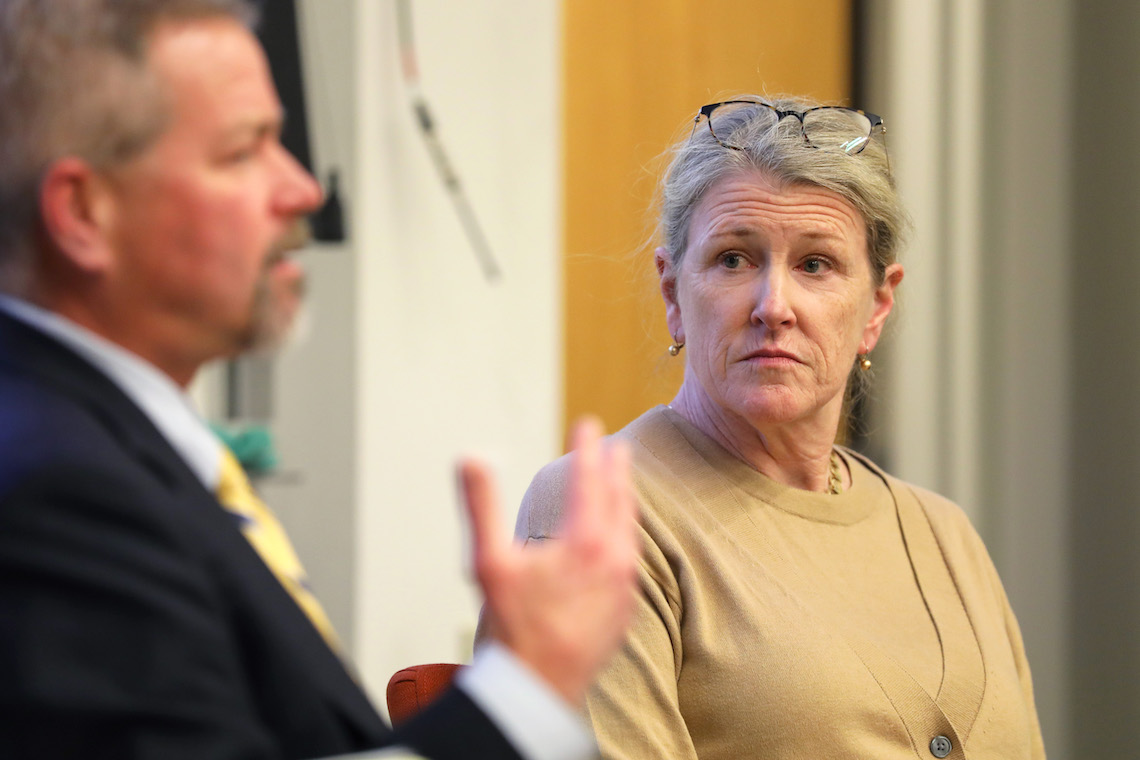Practicing medicine in a small town shouldn’t mean small-time quality of care. Three healthcare experts visited the University of Southern Maine to share their ideas about how to live up to that principle.

The panel discussion titled A Vision for Maine’s Rural Hospitals was held on November 28 at the Wishcamper Center in Portland. It’s the first in a planned series of community forums, organized jointly by the Muskie School of Public Service and the Catherine Cutler Institute in keeping with their commitment to civic engagement.
“We see that as one of our duties,” said Dr. Firooza Pavri, Associate Dean of the Muskie School. “To bring together people from the community and from the University to discuss issues that are germane to the big topics that we consider, something like this is fantastic.”
The Muskie School was represented on the panel by Senior Research Associate John Gale. He was uniquely qualified to serve as moderator through his years of study and analysis of the issues surrounding rural health services.
Gale opened the forum with an overview of the topic. More than a third of Maine’s rural hospitals are at financial risk due in part to low patient volumes and narrow operating margins. When hospitals close, patients must travel farther to get to the next hospital, leaving healthcare out of reach for those without access to transportation.
Low staffing is a major stressor across the industry, and not only for large population centers. Rural hospitals have a hard time attracting and retaining personnel who are also being courted by urban hospitals with bigger paychecks and more resources. Maine’s lack of available housing stock poses another barrier to recruitment.

“Workforce is the defining crisis in healthcare at the moment,” Gale said.
The Maine Department of Health and Human Services (DHHS) has also been tracking those trends for years and took steps to address them. The Maine Rural Health Transformation Initiative launched in 2019. It called for broadband expansion to support increased telehealth services and training programs for healthcare careers starting in high school.
Then, the COVID-19 pandemic hit. Progress slowed on the rural health initiative shortly after it started as the entire healthcare system shifted to deal with the immediate crisis.
From her seat on the panel, DHHS Commissioner Jeanne Lambrew explained how COVID’s effects on the healthcare system are still being felt. Staffing shortages intensified as stressed workers resigned or retired. And patients who delayed non-COVID treatment saw their conditions worsen. As a result, hospitals operate differently today than pre-pandemic.
“When are we ready to figure out what is the new normal?” Lambrew asked.
Out of the darkness of the pandemic emerged some bright spots for rural hospital. The influx of about $700 million in federal and state emergency funding for Maine hospitals brought financial stability. Budget concerns are flaring up again as those funds run out.
Maine’s healthcare community had to coordinate like never before to handle the crisis. Urban hospitals with intensive care units were flooded with COVID patients. Patients with less severe conditions were transferred to rural hospital to relieve overcrowding. Lambrew credited the Maine Hospital Association (MHA) for helping facilitate those partnerships.

The MHA’s Vice President of Financial Policy, David Winslow, was also on the panel. He sees value in continuing the partnership model beyond the pandemic and points to long-term care, ambulance services, and behavioral health as areas that could benefit from cooperation.
“I think that the system has reached a point where it’s not working for a lot of people. . . It kind of needs to be rethought in a comprehensive way,” Winslow said.
The Critical Access Hospital designation is another option for struggling facilities. Participating hospitals qualify for enhanced Medicare reimbursement if they stick to prescribed limits on inpatient beds and lengths of stay. While acknowledging that the designation has saved many hospitals from closure, Winslow remains hesitant about eliminating beds that might be needed later.
Dr. Jeffrey Sedlack would like to shake up the status quo even further. He earned a spot on the panel through his work as Medical Director of Point32Health, the parent company of insurance provider Harvard Pilgrim Health Care.
His research into military logistics taught Sedlack the importance of better allocation and organization of medical resources. That lesson was reinforced by the years he spent working as a surgeon in Alaska. Careful planning was essential to serve the sparse population across such a vast landscape.
If rural hospitals are going to survive, Sedlack recommends discontinuing services they can’t afford in order to strengthen the ones that are financially viable. Maternity wards, for example, would be exclusive to urban hospitals under his vision. Sedlack knows the increased travel times would meet resistance, but he believes the results will win over his critics.

“It’s time for our way of doing things to evolve, to turn into something different and better,” Sedlack said.
Lambrew asked if insurance companies could be expected to help patients cover their travel expenses and hotel stays. Sedlack answered with a price check for knee replacement surgery. The $30,000 bill for treatment in Portland balloons to $60,000 at certain rural hospitals. When presented with the math, Sedlack argued that most patients would choose to travel any way.
Their exchange encapsulated the forum’s recurring theme of finding the right balance of cost efficiency, clinical effectiveness, and patient convenience while providing essential services close to home.
The panelists also invited the audience to join their conversation. One questioner asked if a greater focus on preventative care might ease the strain on hospitals. Sedlack stressed that progress is already being made. He touted his work with Lambrew on the Maine Vaccine Board, which provides children with the full complement of recommended shots.
The lively back-and-forth flow ideas fulfilled the goal of the forum and set the template for future entries in the series. The Muskie School and Cutler Institute intend to host as many as four more forums over the course of the spring semester.

